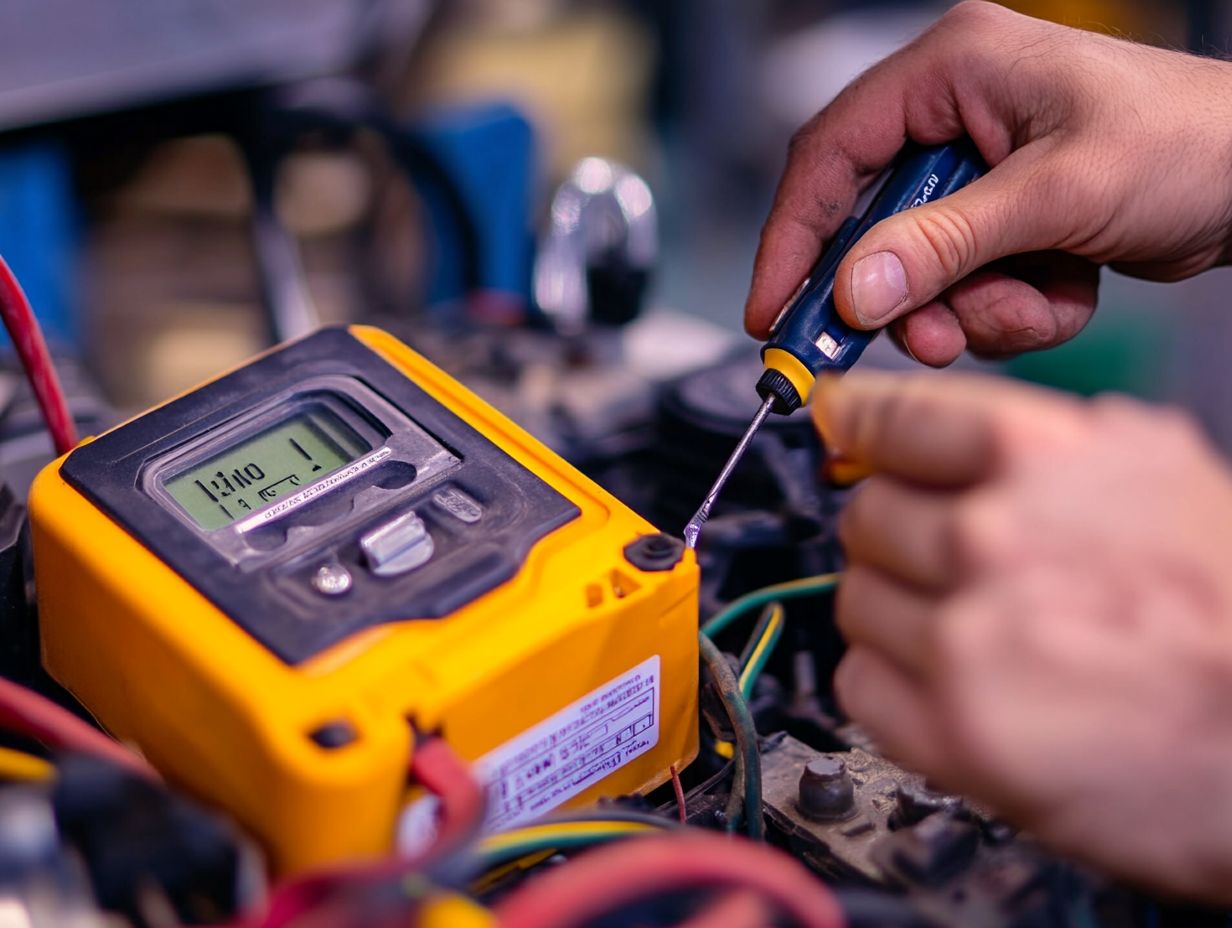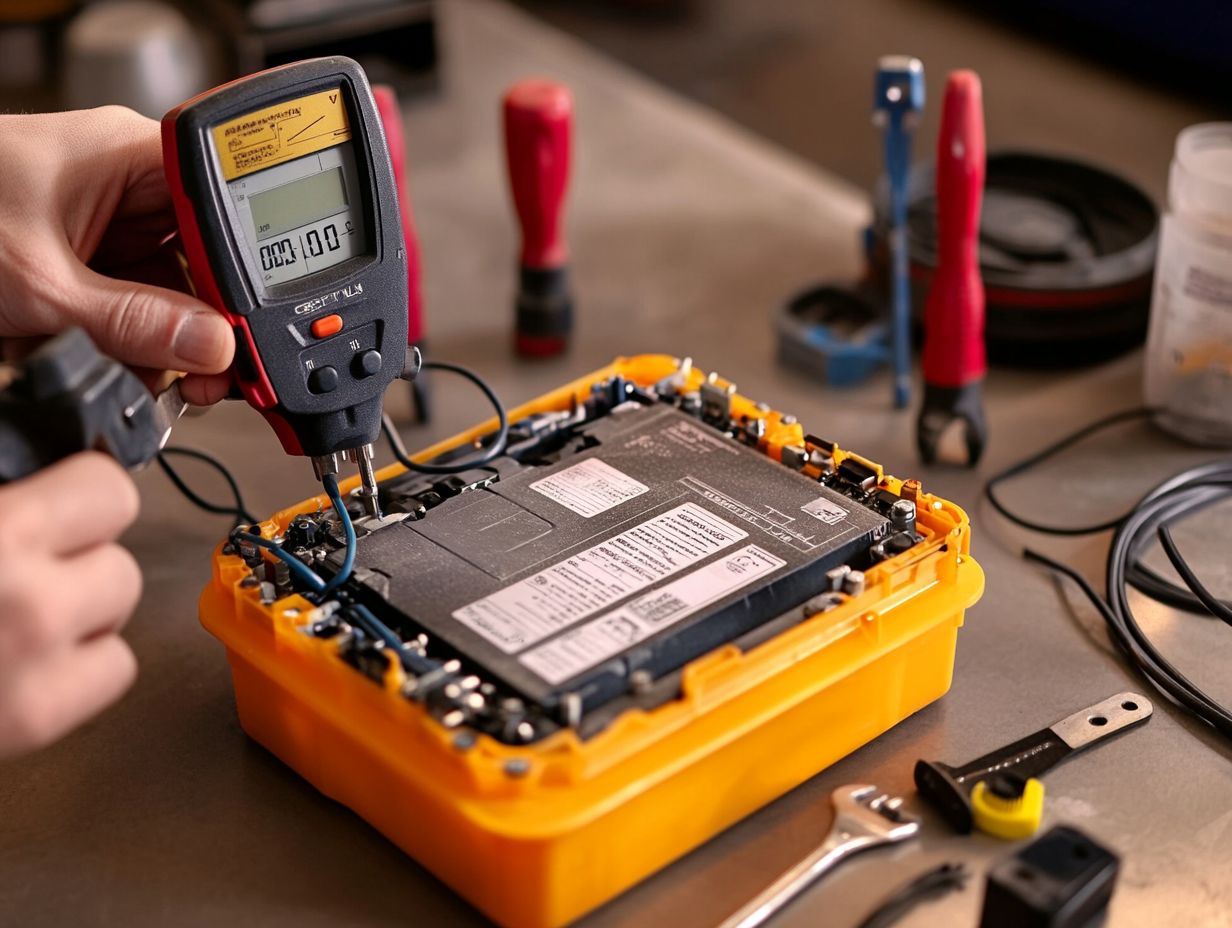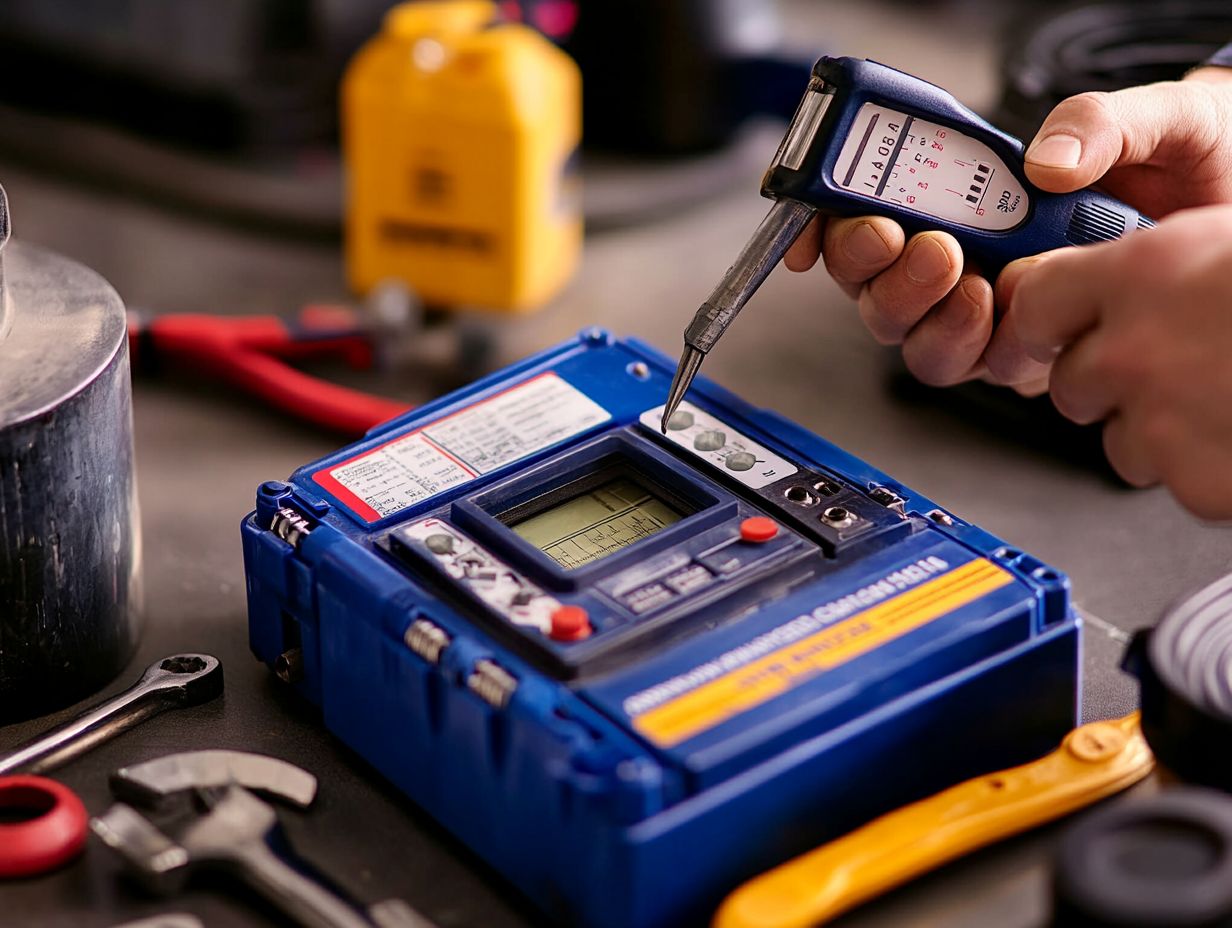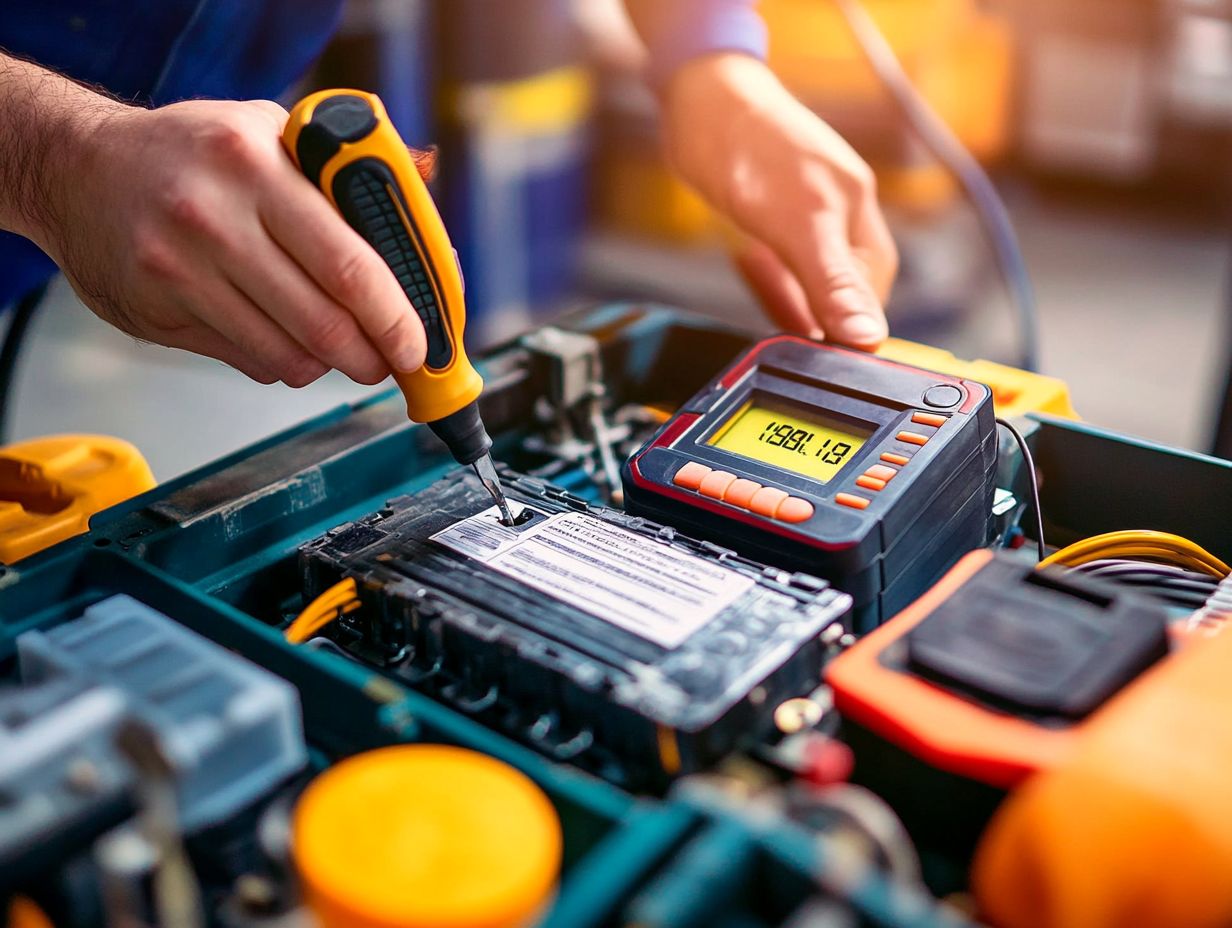How to Maintain Your Car’s Battery Health
Your car s battery is the unsung hero of your vehicle, quietly powering everything from the engine to the electronics. Recognizing its significance and maintaining its health can save you from unexpected breakdowns and expensive replacements.
This article delves into the signs of a failing battery, shares preventive maintenance strategies, and offers insights on how to extend its lifespan. Learn how to quickly handle a dead battery it could save your day!
Keep your ride operating seamlessly by mastering the art of battery care!
Contents
- Key Takeaways:
- The Importance of Maintaining Your Car’s Battery
- Signs of a Failing Battery
- Preventive Maintenance Tips
- Conclusion
- Extending Battery Life
- Dealing with a Dead Battery
- Frequently Asked Questions
- Tips for Maintaining My Car’s Battery Health
- How Often Should I Check My Car’s Battery Health?
- Signs That My Car’s Battery Needs Maintenance
- How Can Extreme Temperatures Affect My Car’s Battery Health?
- What Should I Do If My Car’s Battery Dies?
- Is It Necessary to Use a Specific Type of Battery for My Car?
Key Takeaways:

- Regular maintenance and preventive measures are key to maintaining your car’s battery health.
- Identifying warning signs can help extend the life of your battery.
- Proper charging, storage, and inspections are essential for a healthy car battery.
The Importance of Maintaining Your Car’s Battery
Maintaining your car’s battery is essential for ensuring the longevity and performance of your vehicle’s electrical system. For detailed guidance, learn how to maintain your car’s electrical system. A well-cared-for battery enhances the overall reliability of your automobile.
By conducting regular inspections and monitoring battery connections, you can avoid unexpected battery failures that might disrupt your journeys.
With the right care and quality products from trusted brands like Interstate Batteries and AutoZone, you can optimize your battery’s lifespan even in challenging conditions like cold weather or summer heat.
Why Battery Health Matters
The health of your car battery is crucial. It directly impacts your vehicle’s performance and overall reliability. To ensure longevity, consider learning how to maximize your EV’s battery life. Regular battery maintenance becomes imperative for every automobile owner.
A well-maintained battery guarantees smooth starts and optimizes your fuel efficiency. Your driving habits play a significant role; for instance, frequent short trips can prevent the battery from fully recharging, leading to less power over time.
Thanks to advancements in battery technology, you now have access to options that provide longer lifespans and enhanced durability. By understanding these factors, you empower yourself to make informed decisions, ensuring your battery remains in peak condition to support your driving needs.
Signs of a Failing Battery
Recognizing the signs of a failing battery is crucial for you as a car owner. Early detection can shield you from unexpected breakdowns and the expense of a costly battery replacement.
Identifying Warning Signs
Identifying the warning signs of battery issues can save you from breakdowns. Look out for common indicators like battery drain, corrosion on connections, and erratic behavior of your car’s electronics.
Regularly check for battery corrosion, which often appears as a white, chalky substance around the terminals. Keeping an eye on the battery charge is essential; consider investing in a battery maintainer to ensure optimal performance.
Evaluating your car’s electronics such as dimming headlights or flickering dashboard warning lights can reveal underlying battery problems. Routine inspections should include cleaning the connections, ensuring they re snug and free from debris.
By consistently monitoring these aspects, you extend your battery’s lifespan and enhance the overall reliability of your vehicle.
Preventive Maintenance Tips

By implementing preventive maintenance tips for your car battery, you can significantly enhance its lifespan and performance. This proactive approach ensures that your vehicle remains reliable and efficient, regardless of the driving conditions you encounter.
Conclusion
In summary, taking care of your car battery is essential for ensuring the longevity and reliability of your vehicle. Regular maintenance and awareness of warning signs can prevent unexpected issues. Start prioritizing battery care today to keep your vehicle running smoothly!
Regular Inspections and Cleaning
Regularly inspecting and cleaning your car battery is essential for maintaining optimal performance and extending its lifespan. Following long-term maintenance tips for electric cars can help you avoid unexpected breakdowns and costly replacements, making it crucial to periodically check your battery’s health.
During your routine inspections, keep an eye out for signs of corrosion, like a chalky or white powdery substance around the terminals, which can indicate that your battery is on the decline.
Cleaning your battery terminals is easy and makes a big difference! You can tackle this with a mixture of baking soda and water. By applying this solution, you can effectively combat corrosion, enhance conductivity, and protect your vehicle’s electrical system.
Proper Charging and Storage
Properly charging and storing your car battery is crucial for maintaining its health and performance. Mishandling it can lead to low battery voltage and failure act fast!
To ensure optimal battery life, use a high-quality charger that matches your battery type while following the manufacturer’s guidelines for charging settings and duration. Regularly checking the battery fluid levels and keeping the terminals clean can greatly enhance connectivity and charging efficiency.
If you plan to leave your vehicle inactive for an extended period, disconnecting the battery or using a trickle charger, which slowly recharges the battery over time, can help prevent unwanted battery drain. By employing these practices, you not only extend your battery’s lifespan but also protect yourself from the inconvenience of encountering a dead battery when you need your vehicle the most.
Extending Battery Life
To extend the life of your car battery, you need to adopt active care. Pay attention to various factors, such as seasonal temperature fluctuations and your driving habits, as these can greatly influence the lifespan of your battery.
Tips for Prolonging Battery Health
To prolong your battery’s health, embrace practical strategies that focus on maintaining clean battery connections and cultivating driving habits that minimize battery drain during your journeys. Additionally, consider following this guide to maintain your car’s electrical system for optimal performance.
Establishing regular maintenance routines is crucial; consider scheduling periodic inspections to identify corrosion and impurities that could hinder performance. For more detailed insights, check out the basics of car electrical system maintenance. By adopting smart driving habits like reducing short trips and avoiding excessive idling, you can significantly enhance your battery’s longevity.
Be mindful of how much power your devices use. Turning off unnecessary accessories when not in use can make a notable difference.
Monitoring your battery’s performance through regular checks allows you to catch potential issues early, ensuring a smoother, more efficient driving experience while extending the lifespan of your battery.
Dealing with a Dead Battery

Encountering a dead battery can be quite the hassle, but mastering the art of jumpstarting or replacing it can save you valuable time and get your vehicle back on the road swiftly.
Understanding the proper techniques will give you the power to handle this situation with confidence and efficiency.
How to Jumpstart and Replace a Battery
Knowing how to jumpstart and replace a battery is essential for you as a car owner. It gives you the power to tackle battery issues with confidence and ensures safety throughout the process.
With just a few simple tools and some basic know-how, you can handle these tasks yourself, saving yourself from costly trips to the mechanic. Familiarizing yourself with the proper techniques not only helps you revive a car that refuses to start but also instills a valuable sense of independence.
Understanding the right steps to safely manage batteries can prevent potential accidents and injuries. Always wear gloves and eye protection when dealing with batteries, as they can sometimes leak hazardous substances.
By following a systematic approach, you can make the experience smooth and stress-free, getting your car back on the road in no time. Take action now to keep your vehicle running smoothly!
Importance of Regular Maintenance for Car Batteries
Regular maintenance of your car battery is key to ensuring the best performance, extending its lifespan, and learning how to test your car’s battery life to prevent unexpected failures that can disrupt your daily commute.
Neglecting this task leads to reduced efficiency and breakdowns. By prioritizing routine battery inspections, you can easily spot potential issues like corrosion the buildup of rust that can impede connections leaks, or loose connections before they escalate.
Cleaning battery terminals and checking fluid levels is simple, but these practices play a significant role in maintaining the overall health of your vehicle’s electrical system. Keeping connections tight and terminals free from grime ensures your battery functions at its best, leading to reliable starts and a longer lifespan.
Ultimately, following these maintenance tips can save you both time and money by reducing the need for frequent replacements.
Frequently Asked Questions
Here are some common questions about maintaining your car’s battery:
Tips for Maintaining My Car’s Battery Health
- Regularly check and clean the battery terminals.
- Avoid draining the battery by turning off all electronics when the engine is off.
- Keep your car’s battery charged by driving it regularly.
How Often Should I Check My Car’s Battery Health?

It is recommended to check your car’s battery health at least every 3 months or before any long trips. This will help ensure that your battery is working properly and prevent unexpected breakdowns.
Signs That My Car’s Battery Needs Maintenance
If you notice your car is struggling to start, the lights are dim, or you hear a clicking sound when turning the key, these are signs that your car’s battery may need maintenance. It is best to address these issues before they become bigger problems.
How Can Extreme Temperatures Affect My Car’s Battery Health?
Extreme temperatures, whether hot or cold, can seriously impact your car’s battery health. High temperatures can cause the battery to overheat and lose its charge, while cold temperatures can make it harder for the battery to function properly. Take action now to care for your battery during extreme weather conditions.
What Should I Do If My Car’s Battery Dies?
If your car’s battery dies, the first step is to try to jumpstart it using jumper cables and another vehicle. If this doesn’t work, you may need to replace the battery. It is also a good idea to have a professional mechanic check the battery to ensure there are no other underlying issues.
Is It Necessary to Use a Specific Type of Battery for My Car?
Yes, it is important to use the correct type and size of battery for your car. Consult your car’s manual for the recommended battery specifications. Using the wrong type of battery can affect your car’s performance and potentially cause damage.
Start your battery maintenance routine today to enjoy trouble-free drives!





